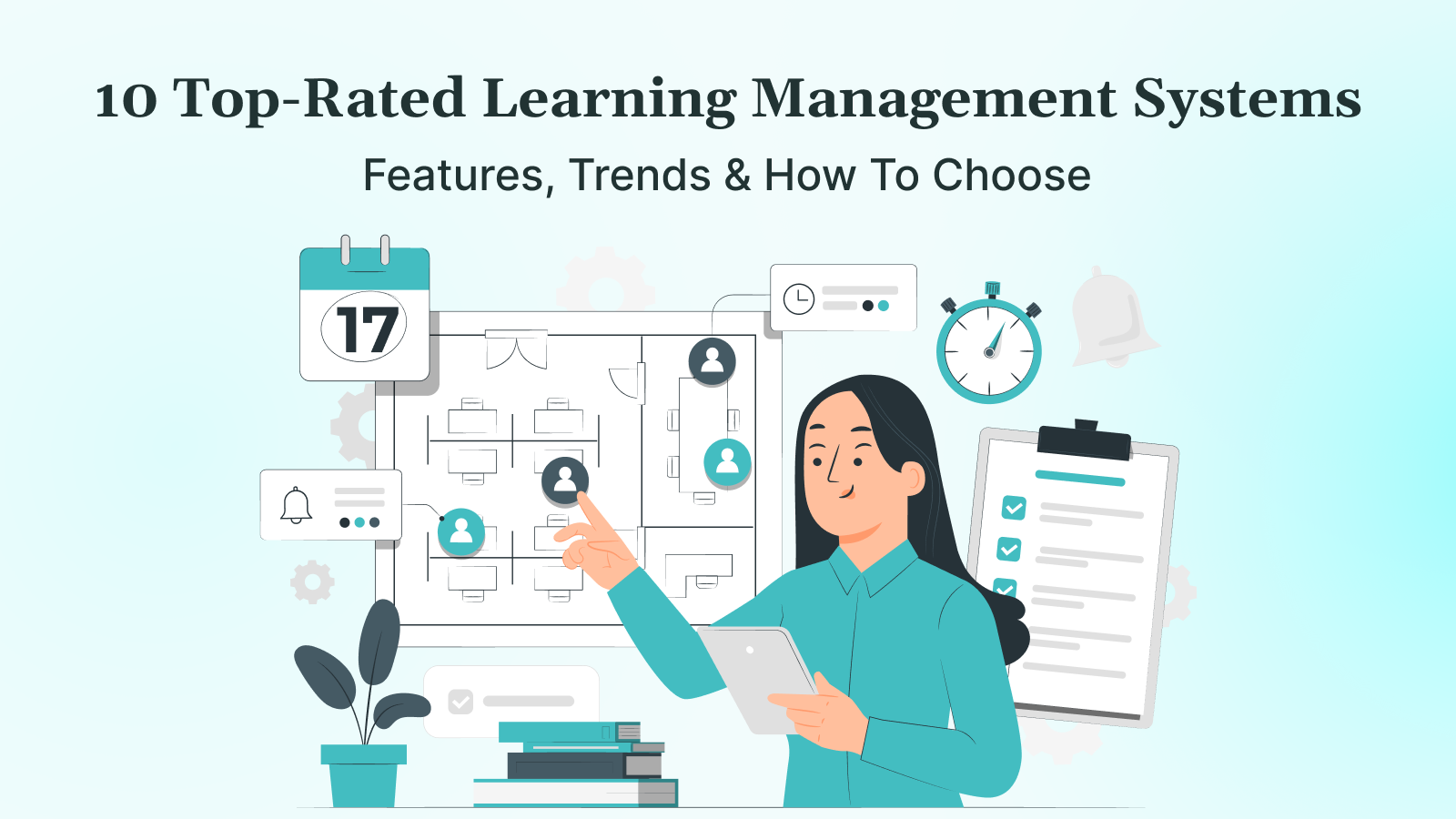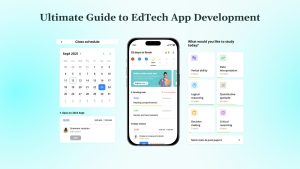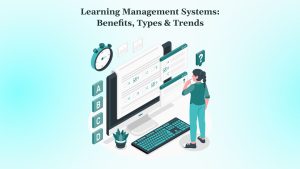The global LMS market is growing rapidly, projected to exceed $22.96 billion in 2025 and reach nearly $44.68 billion by 2029. That growth reflects widespread adoption across corporate, higher-ed, and K‑12 sectors.
Today’s top LMS platforms are paired with AI, integrate easily into other systems, and support mobile learning.
This blog evaluates the top-rated learning management systems for 2025, explores key market trends, and provides a strategic guide for choosing or even building a system tailored to your needs. Let us start by understanding what a learning management system is.
Key Takeaways
- Market momentum: LMS adoption is rising sharply across sectors.
- A top LMS excels in user experience, reporting, and integration.
- Key 2025 trends include AI-adaptive learning, microlearning, and standard compliance.
- We review the 10 leading LMS platforms, comparing their strengths.
- We guide you through the selection criteria and when to custom-build with DEVtrust’s support.
What Is A Learning Management System?
A Learning Management System (LMS) is a software platform designed to create, deliver, and oversee educational or training programs. It combines tools for course creation, user management, assessments, and reporting into a single, unified system.
As a result, instructors and administrators can organize content, track participation, and assess learners in a centralized environment.
The value of an LMS lies in its ability to automate administrative tasks and support consistent delivery of training materials. It accommodates diverse content formats such as documents, quizzes, discussion threads, and video conferences, while ensuring user progress and performance are traceable.
This centralized control promotes standardization and scalability. Whether it is onboarding employees in a global company or teaching students across campuses, an LMS ensures the right content reaches the right audience at the right time.
It is a system designed to engage learners, enforce compliance protocols, and drive measurable learning outcomes. How will you know if an LMS is worth it, though?
What Makes An LMS Worth It?
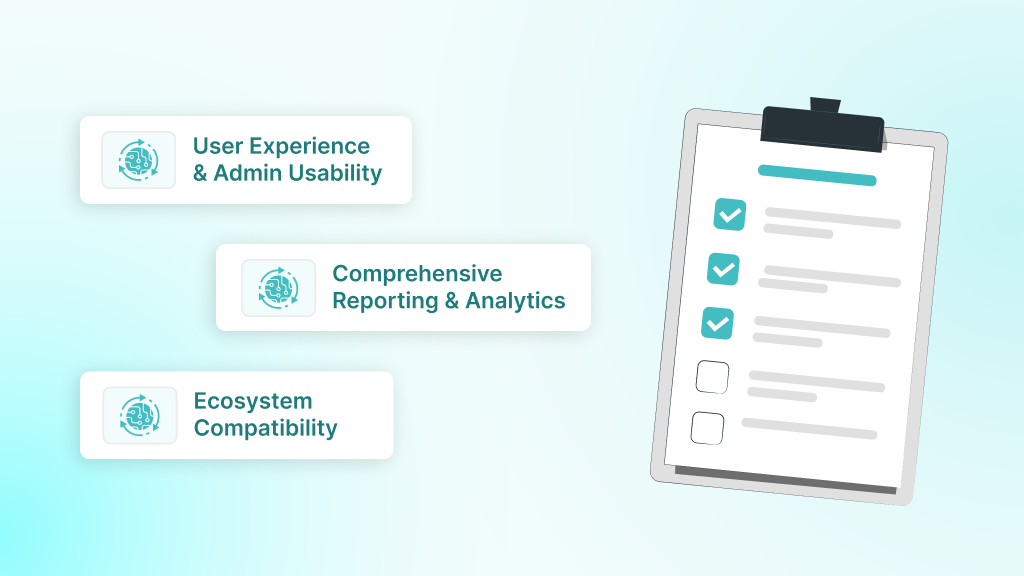
A top-tier LMS enhances how learners interact and how teams administer training. It streamlines workflows, uncovers insights from learning data, and supports interoperability. Below, we examine three critical qualities that distinguish an effective LMS.
User Experience & Admin Usability
A learning system must be intuitive and convenient for both learners and admins. Interfaces that are clean, mobile-ready, and easy to navigate promote engagement and reduce friction. When learners can focus on content without struggling to find it, adoption rates improve.
As per UX research on enterprise learning platforms, intuitive navigation, responsive design, and clear feedback loops are the keys to delivering a satisfying experience.
Admins benefit when systems enable role-based control, smooth user management, and self-service features. That saves time otherwise spent on manual enrollment, access resets, or support tickets. Effective LMS platforms offer clear dashboards with user tracking, content assignment, and reporting tools, all within an intuitive administrative interface.
Comprehensive Reporting & Analytics
An LMS without solid analytics is like flying blind. Reporting tools must track learner behavior, completion rates, engagement patterns, and KPIs. Advanced analytics systems go further, allowing custom dashboards, cohort tracking, and even predictive alerts for at-risk learners .
Effective platforms let instructors monitor usage trends and quickly identify gaps in training impact. They can then adapt content, adjust pacing, or provide targeted support. That level of insight turns an LMS into a tool for continuous improvement rather than a static repository.
Integration & Ecosystem Compatibility
Today’s learning platforms rarely exist in isolation. They must integrate with HR software, authentication systems, video tools, authoring platforms, and data warehouses.
Support for standards like SCORM, xAPI, and LTI ensures compatibility and simplifies content import. Open APIs further allow custom connectors and data pipelines.
Seamless integration prevents data duplication, improves reporting, and ensures learner progress syncs across systems. For enterprises or educational institutions, this endpoint connectivity is essential for cohesive operations and learner experience.
These three pillars form the basis of a high-impact LMS. Choosing a platform that excels in these areas ensures that your system drives learning, insights, and operational synergy. Let us jump in to know the top-rated learning management systems in 2025.
Top Rated Learning Management Systems in 2025
Now that you understand what makes an ideal LMS, we can move on to understand the top-rated learning management systems in 2025:
1. TalentLMS
Designed for teams of all sizes, it offers strong integration capabilities out of the box. Administrators can customize branding, workflows, and automation rules, all without writing code.
TalentLMS is a cloud-first, easy-to-use platform designed for fast launches and scalable training environments. It supports blended learning, mobile delivery, and e-commerce.
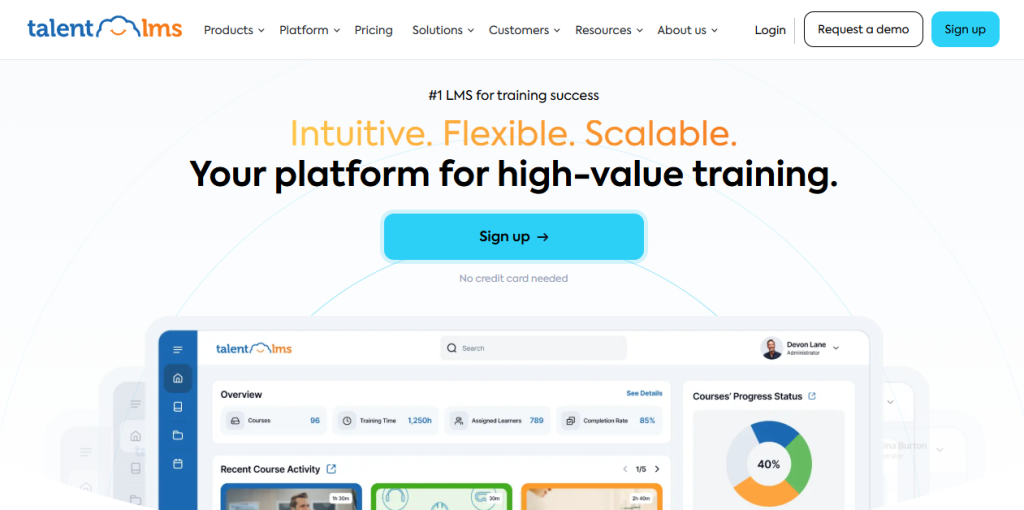
Key features
- AI-powered course creation and content generation
- SCORM, xAPI, and cmi5 support
- Gamification with badges, leaderboards, and certifications
- API-first design with native integrations to HRIS and communication tools
TalentLMS is ideal for small to mid-sized organizations seeking a quick-to-deploy, branded platform with strong automation and mobile support.
2. 360Learning
360Learning emphasizes collaborative, peer-driven learning through its LMS + LXP design. The system accelerates course creation with AI and fosters knowledge sharing through social features and cohort-based learning experiences.
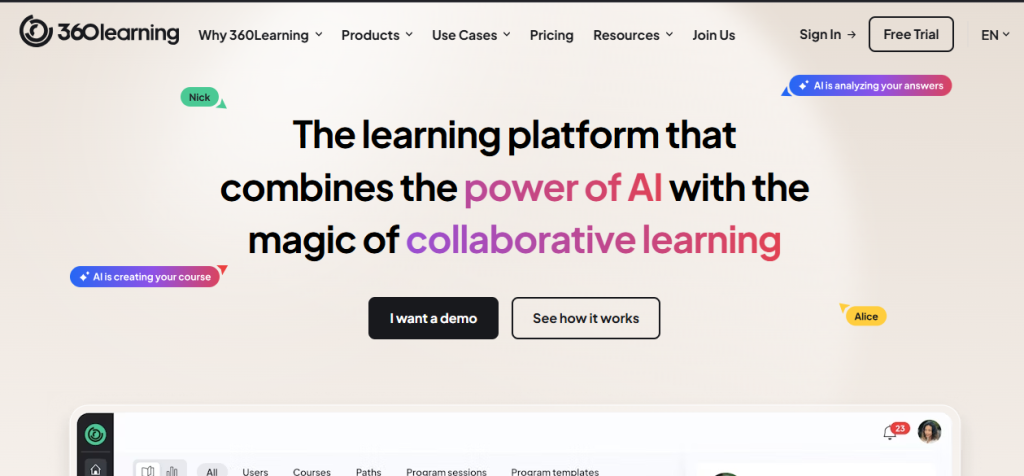
Key features
- AI-assisted authoring with automated quiz generation
- Automated enrollment workflows tied to HRIS data
- Support for instructor-led, self-paced, and cohort-based training
- SCORM and xAPI compatibility for standards-based content
The platform is best suited for organizations focused on employee-driven content, skills mobility, and blended learning strategies.
3. Docebo
Docebo Learn is a scalable, enterprise-grade LMS with powerful AI tools for personalization and skills development. It integrates with HR, video tools, and e-commerce. The platform supports multiple use cases, including external training and compliance programs.
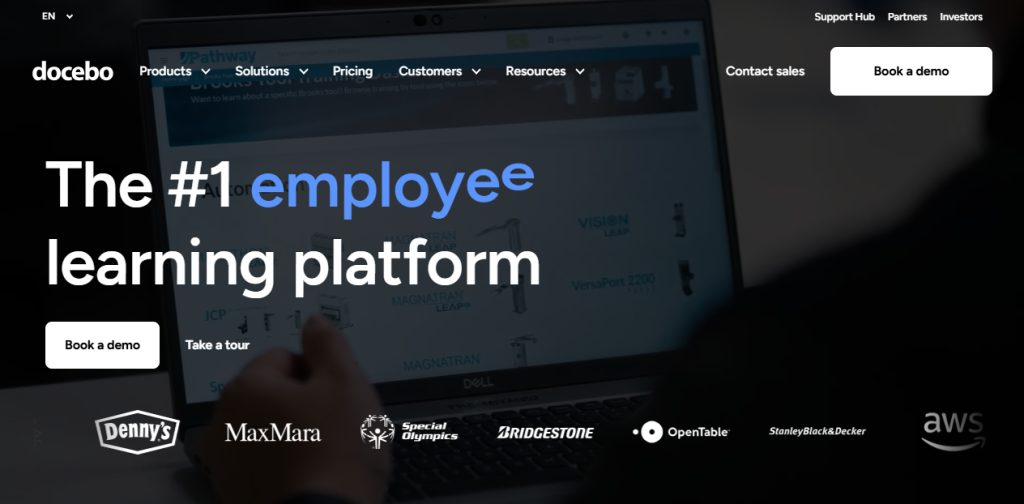
Key features
- AI-driven content recommendations and automated enrollments
- Extended-enterprise portals for partners and clients
- Large content marketplace and social learning tools
- Analytics-rich dashboards and governance controls
Docebo is well-suited for mid-sized to large enterprises needing advanced personalization, external user support, and robust analytics.
4. Moodle
Moodle is a mature, open-source LMS known for its flexibility and scalability across academic and corporate settings. Its plugin architecture supports diverse workflows, social learning, and secure, multi-language delivery.
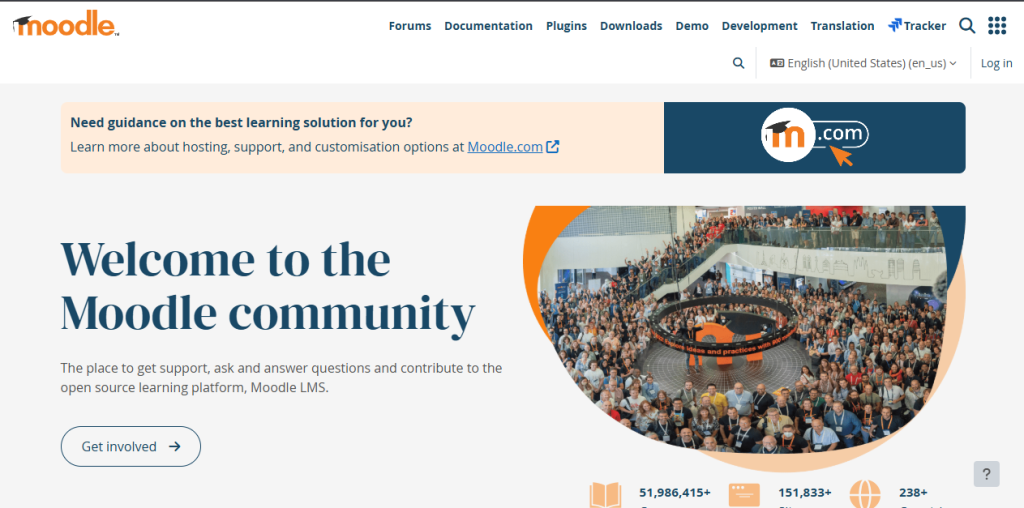
Key features
- Modular activities: forums, wikis, quizzes, and assignments
- Gamification and competency tracking via gradebook and badges
- Multilingual support and an extensive plugin ecosystem
- SCORM, LTI, and xAPI compatibility, plus secure authentication options
A good choice for institutions and teams needing full customization, compliance controls, and strong community support.
5. Absorb LMS
Absorb LMS offers a modern, engaging learning experience with strong admin tools and branding flexibility. It supports compliance, e‑commerce, and AI-powered features to automate content creation and recommendations.
The system scales from small teams to global enterprises, and it includes mobile access, observational checklists, and robust security standards.
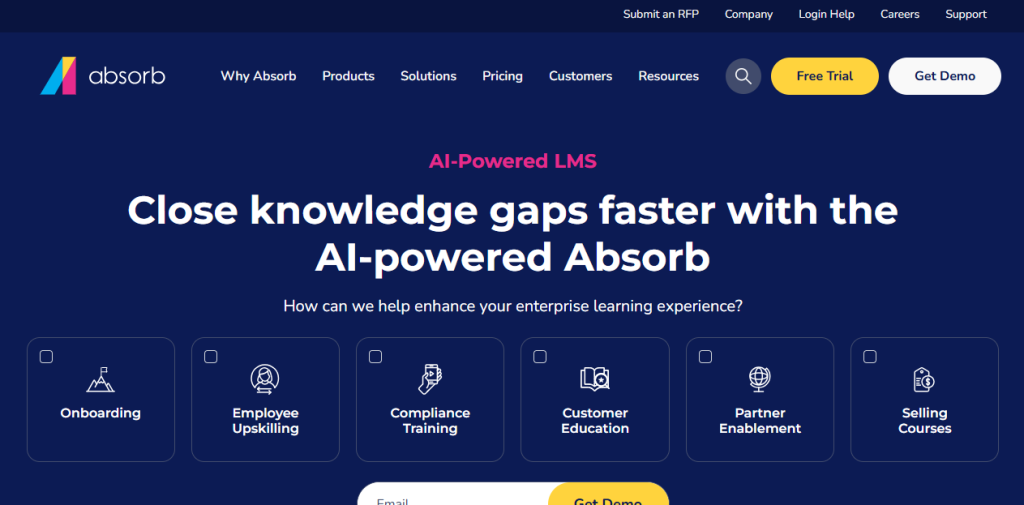
Key features
- AI-powered course and quiz creation
- Turn-key content library with SCORM/xAPI support
- Observational checklists for compliance and skills verification
- Fully integrated e‑commerce and mobile functionality
Absorb LMS is ideal for mid‑to‑large organizations needing strong automation, compliance support, and embedded content sales.
6. Degreed
Degreed is a skills-first learning platform that emphasizes continuous upskilling and workforce alignment. The system curates learning pathways from internal and external content sources.
It tracks skill development and certifications, enabling teams to align training with enterprise objectives seamlessly.
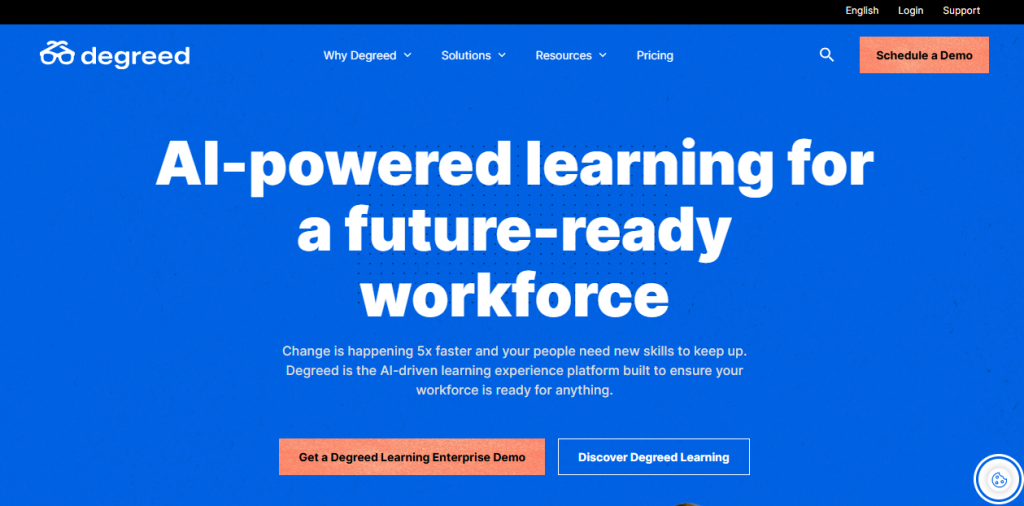
Key features
- Skill development dashboards and certification tracking
- Personalized content curation from internal and external libraries
- Integration with enterprise tools and learning ecosystems
- Analytics on skill adoption and usage patterns
Degreed best suits large enterprises focused on strategic skills development across roles and departments.
7. Thrive
Thrive combines LMS, LXP, and communications tools in one platform. It offers social learning feeds, compliance management, and AI-powered recommendations.
Thrive supports global learning teams with localization and integration, which is ideal for organizations that want to merge training, communication, and knowledge management.
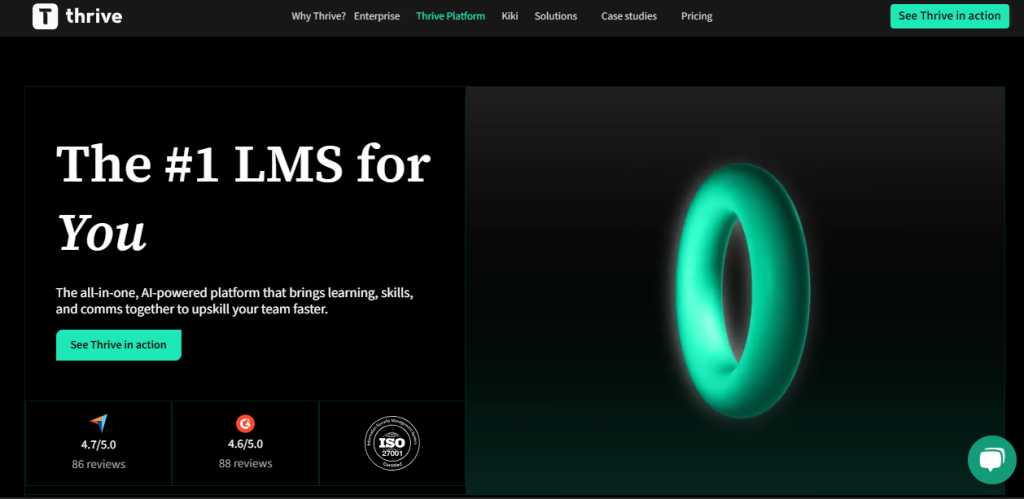
Key features
- Social feeds, discussion boards, and campaign tools
- AI-powered insights and staff skill tracking
- Compliance workflows with reporting dashboards
- Mobile-ready and multilingual platform
Thrive is a great fit for organizations seeking an all-in-one solution blending learning, knowledge sharing, and internal communications.
8. Learning Pool
Learning Pool focuses on data-driven, personalized workplace learning at scale. Its platform adapts content based on learner progress and roles.
It integrates with various content providers and supports smart pathways and compliance workflows.
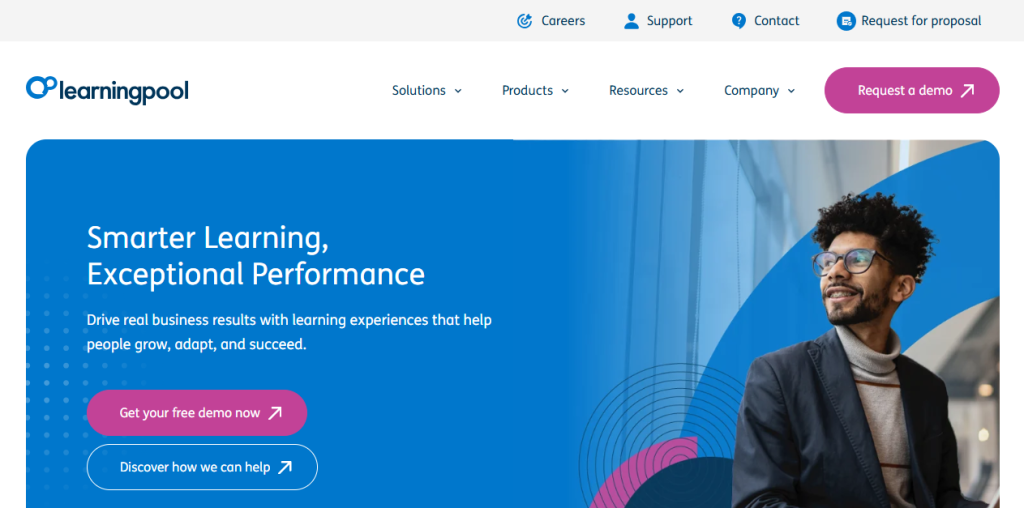
Key features
- Personalized learning paths based on performance analytics
- Scalable content delivery for large employee groups
- Comprehensive content library integrations
- Compliance workflows and tracking panels
Learning Pool proves ideal for mid-to-large enterprises focusing on proactive workforce development and compliance.
9. Canvas LMS
Canvas is a widely adopted LMS in education and corporate training. It offers intuitive course design, integrated video tools, and mobile-friendly learning.
Canvas supports LTI and SCORM and features a clean interface, making it easy for faculty and learners to connect.
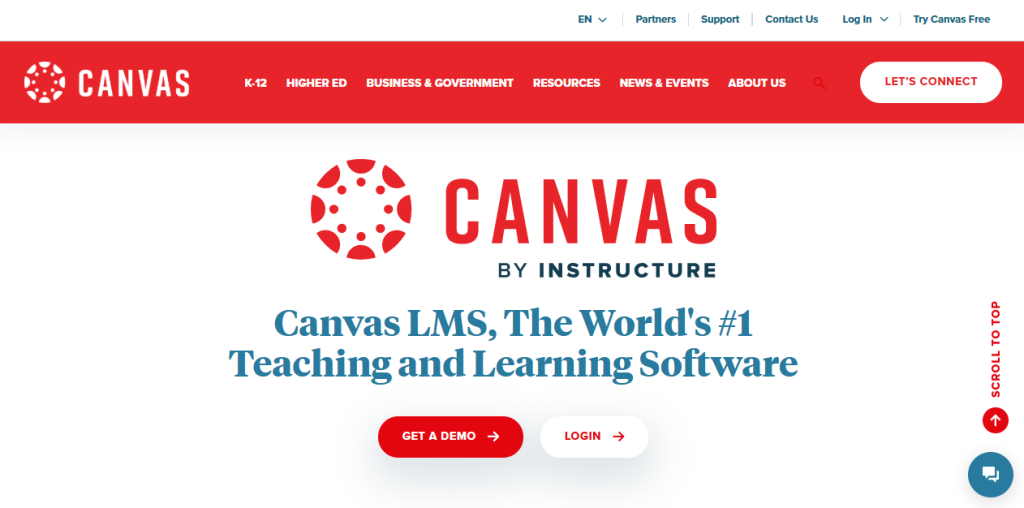
Key features
- Integrated multimedia and mobile-ready UI
- Standard support for LTI, SCORM, and xAPI
- Clean interface with calendar, gradebooks, and collaboration
- Plugin support and institutional integrations
Canvas LMS is well-suited for academic institutions and corporate clients needing institutional-scale deployment with strong compliance.
10. Blackboard Learn
Blackboard Learn is a long-established LMS widely adopted in higher education and enterprise training. It offers both self-hosted and cloud-based (SaaS) deployment models, including the modern “Ultra” interface.
The platform supports extensive customization via open APIs and building blocks, allowing schools and businesses to tailor course delivery, assessments, and authentication processes to their unique needs.
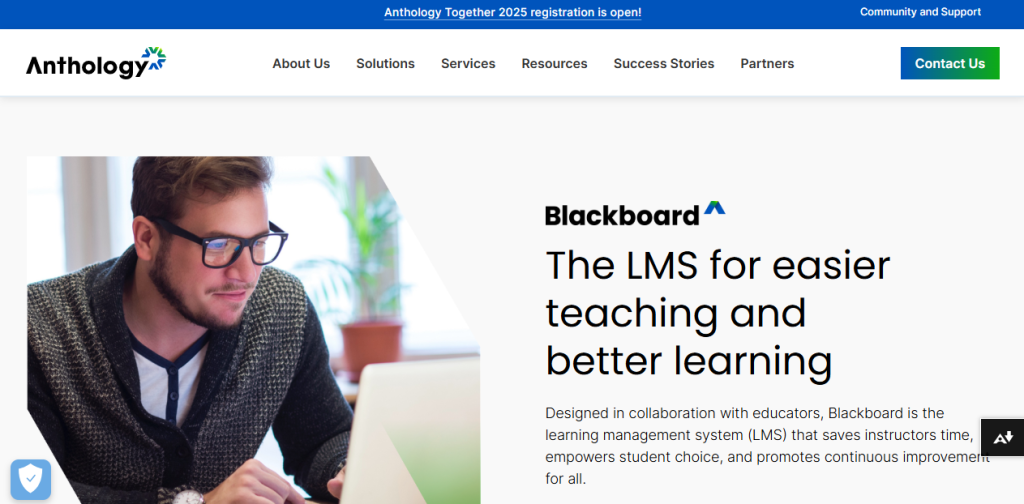
Key features
- Analytics for Learn tool, integrating LMS data with SIS information for rich engagement.
- Supports both self-hosted servers and AWS-hosted SaaS environments
- Includes McGraw‑Hill materials and plagiarism checking via SafeAssign
- Customizable interface and workflows, with Ultra UI and plugin support for tailored learning experiences
Blackboard Learn suits large universities, government organizations, and enterprises needing advanced SIS integration, analytics, and compliance support.
Let us have a look at the tabular comparison 10 top-rated LMS platforms, highlighting their core strengths and ideal use cases in a clear overview:
| Platform | Standout Features | Ideal For |
| TalentLMS | AI course creation, SCORM/xAPI support, gamification, and branching learning paths. | SMBs and fast-growing teams need rapid deployment |
| 360Learning | Collaborative learning tools, AI-assisted authoring, peer reviews, cohort-based courses | Organizations focused on internal knowledge sharing and upskilling |
| Docebo | AI-driven content recommendations, extended enterprise portals, and marketplace integrations | Large enterprises seeking personalization and learning scalability |
| Moodle | Open-source, extensive plugin library, multilingual support, SCORM/LTI compatibility | Institutions needing full customization and compliance |
| Blackboard Learn | SIS integrations, built-in analytics, flexible UI (Ultra or legacy), content partnerships | Universities and enterprises with complex academic workflows |
| Absorb LMS | AI-powered quiz creation, compliance checklists, e-commerce, and 24/7 support | Mid-to-large organizations needing strong compliance and automation |
| Degreed | Skill dashboards, certification tracking, and enterprise-grade integrations | Enterprises focused on strategic workforce development |
| Thrive | Social learning feeds, AI recommendations, compliance workflows, and multilingual UI | Companies needing blended learning with a social, modern touch |
| Learning Pool | Scalable content delivery, analytics-driven paths, and compliance tracking | Large organizations require detailed governance and insight |
| Canvas LMS | Multimedia integration, mobile-ready UI, LTI/SCORM support, plugin architecture | Academics and corporates seeking intuitive, extensible systems |
Market Trends Driving LMS in 2025
Understanding the forces reshaping the LMS market helps you select platforms that will evolve with your needs. Here are three major trends influencing adoption and innovation in 2025, backed by industry research.
AI & Adaptive Learning
AI integration in education is transforming LMS capabilities. Platforms leverage machine learning to personalize content, assess learner progress, and guide individual learning paths.
A recent study found that the global AI in education market, which includes adaptive LMS, grew to $5.88 billion in 2024 and may expand by fifty percent by 2030.
Research also highlights AI-powered LMS tools boosting learner performance and engagement through intelligent tutoring and analytics. This trend makes intelligent, context-aware education more accessible across sectors.
Microlearning & Mobile Accessibility
Bite-sized modules and mobile delivery are driving LMS usage. Microlearning is defined as short, focused learning units lasting under a few minutes. It improves engagement and knowledge retention.
Microlearning delivered via mobile platforms enhances learner satisfaction and accessibility. Experts now recommend designing LMS content in modular forms optimized for smartphones and tablets. This shift accommodates remote workforces and blended learning contexts.
Interoperability Standards & Compliance
Modern learning needs rely on multi-system ecosystems. Adherence to interoperability standards such as SCORM, xAPI, and LTI ensures content portability and data consistency across platforms.
Many organizations now demand LMS compatibility with HR systems, CRMs, and content authoring tools. This promotes seamless data exchange and long-term platform flexibility. Without this foundation, institutions risk vendor lock-in and fragmented learning experiences.
These trends signal where LMS investments should focus. By aligning your selection with these drivers, you will adopt platforms that remain effective as learning evolves.
The choices in LMS systems are diverse, so how can you choose the right learning management system?
How To Choose The Right LMS For Your Needs
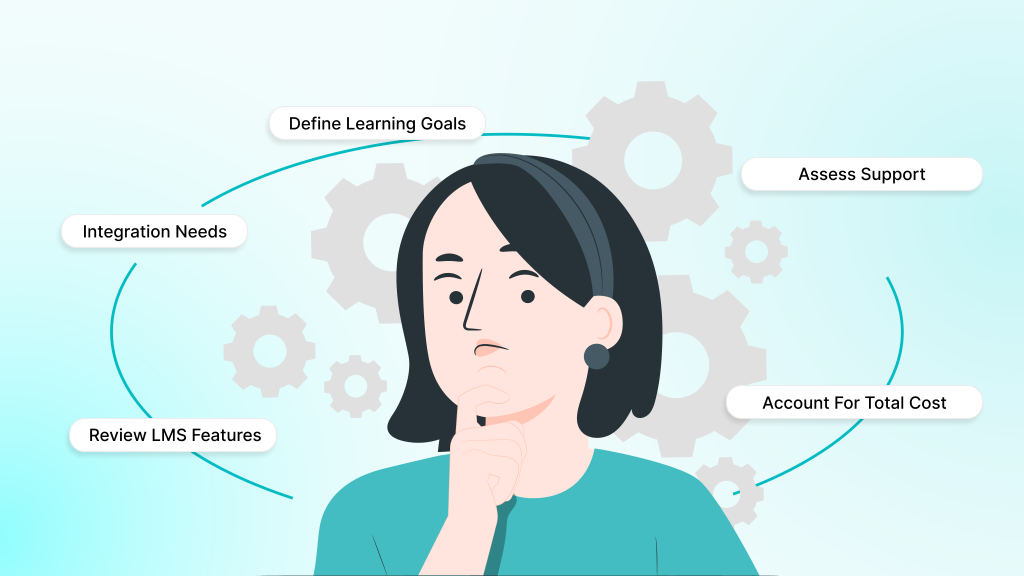
Selecting an LMS is a strategic decision. It is about meeting your organization’s goals, processes, and growth. The following steps provide a clear framework to evaluate and decide effectively.
Define Learning Goals First
Start by identifying what success looks like for your LMS. You might aim to reduce onboarding time, improve compliance scores, or increase customer satisfaction. Clearly defined goals help guide functional needs and set benchmarks.
For example, if rapid onboarding is essential, prioritize platforms with strong automation and course-assignment tools.
Evaluate Integration Needs
Your LMS will likely sit alongside existing systems like HR, CRM, SSO, and content tools. Compatibility through APIs and standards like SCORM, xAPI, and LTI ensures seamless workflows and centralized reporting.
According to industry reviews, integration ease is a defining factor in LMS ratings. Be sure your shortlist supports these protocols and can connect smoothly with your software landscape.
Go Through Essential LMS Features
Consider core feature sets that directly impact learning delivery and management. Look for mobile access, customization, user management, content authoring, and assessment tools. Analytics dashboards and reporting capabilities should align with your KPIs.
Expert buyer guides emphasize this mix of usability, insight, and adaptability as non-negotiable components.
Assess Support & Implementation
Even the best LMS can fail without proper onboarding. Choose providers that offer timely technical support, structured implementation assistance, and community resources. Responsive support correlates strongly with user satisfaction.
Consider also the time and effort your team can commit during the rollout phase. DEVtrust makes LMS implementation far easier. Want to know how? See how we supported Coachability with smart integrations for onboarding.
Account For Total Cost & Growth
The initial license fee is just the start. Account for setup costs, additional modules, user scale, integrations, and ongoing support. Calculate how pricing scales with your organization. Long-term flexibility matters.
Your LMS should scale without disproportionate cost increases. Buyer guides consistently flag total cost of ownership and planned growth paths as critical decision drivers.
Following these focused steps ensures you select an LMS that aligns with your strategic objectives, integrates seamlessly, delivers essential capabilities, offers reliable support, and scales cost-effectively. When these elements come together, the right LMS becomes the backbone of learning success.
However, you need to realize that sometimes a commercial LMS platform may not be sufficient. You may need a custom LMS for your diverse needs.
When a Custom LMS Makes Sense
While commercial LMS platforms check many boxes, there are scenarios where building a custom LMS is a smarter long-term investment. If your training needs involve complex workflows, tight integrations, or compliance demands beyond standard templates, that is when custom development truly shines. A custom-made LMS can:
- Align precisely with your unique learning processes, audience segments, and brand identity
- Integrate deeply with HR systems, CRM, ERP, and custom APIs to centralize data and reporting
- Support specialized content types, certification paths, and compliance workflows
This is precisely where DEVtrust steps in with tailored solutions that bridge gaps left by off-the-shelf products. It helps through:
- Comprehensive custom LMS builds from the ground up, shaped around your business needs (assessment, UX/UI, integrations)
- Expert connector development and robust API integration to sync with HRIS, CRM, single sign-on, and payment systems
- Secure, scalable architecture deployed on cloud platforms, with full control over data privacy and system behavior
- Ongoing governance, maintenance, and iterative optimization, keeping your LMS compliant, stable, and aligned with growth
Choose custom when your learning context demands precision. Read more about how DEVtrust helped Edtech AI’s learning management with integrated communication features that join the otherwise disintegrated school management process and communication channels between teachers & students. With DEVtrust as a partner, you gain both the flexibility of tailored design and the long-term reliability of supported infrastructure.
Conclusion
Choosing the right LMS is a strategic decision that shapes learning quality, integration, and scalability. Whether you go with a top-rated SaaS platform or opt for a custom solution, clarity on your goals and ecosystem needs is key. This blog has equipped you with the criteria, trend insights, and platform comparisons required to make an informed choice.
If your team needs a custom LMS solution, DEVtrust delivers end-to-end LMS development. From architecture to deployment, maintenance, and optimization, DEVtrust makes custom LMS projects seamless.
Talk to DEVtrust to explore how a custom LMS can be built precisely for your needs and start designing training platforms that scale with your organization.
10 Top-Rated Learning Management Systems In 2025: Features, Trends & How To Choose
Discover top rated learning management systems for 2025. SAP SuccessFactors offers AI-driven tools, while TalentLMS excels in flexibility. Explore Litmos for compliance, and choose Paradiso LMS for gamification. Elevate eLearning now!
Contact Us